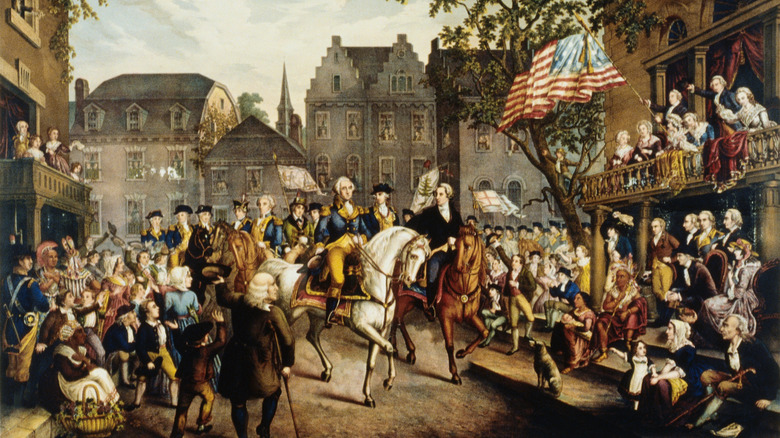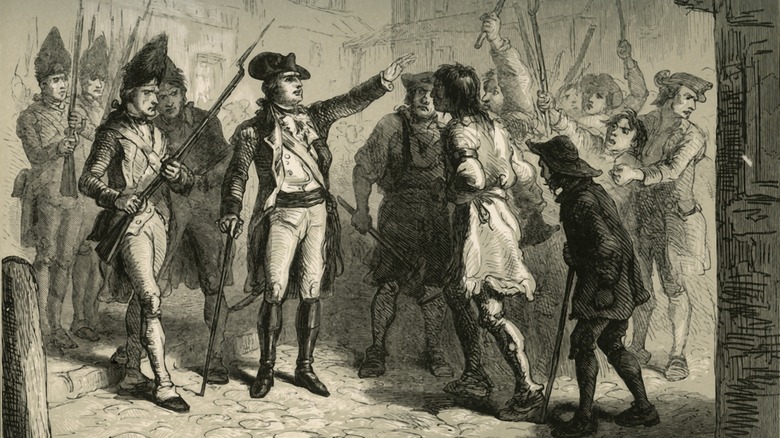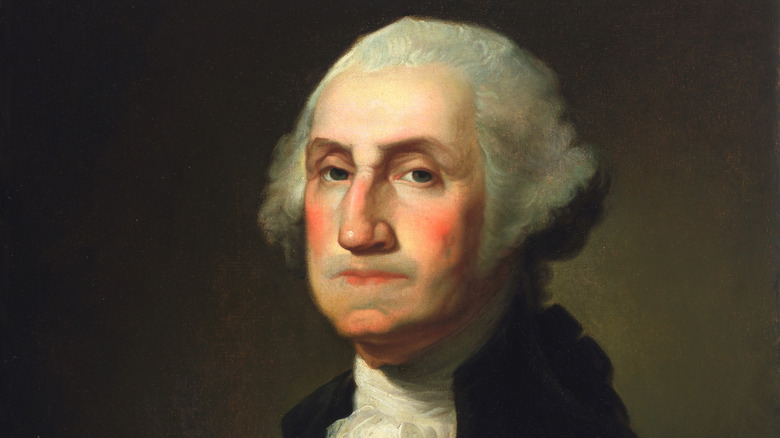Why People Think George Washington's Bodyguards Tried To Kill Him
On June 28, 1776, a member of George Washington's elite bodyguard unit shuffled onto the gallows to be hanged before a crowd of 20,000 Americans. Among the spectators were many soldiers — Washington had ordered every man not on duty to watch the spectacle in the hopes of frightening them into remaining loyal (via Intel.Gov).
Thomas Hickey was the first continental soldier to be executed for treason in the U.S., and it is believed that he may have been part of a complicated web of traitors involving everyone from Washington's housekeeper to the mayor of New York. Many other people were implicated in Hickey's plot, including another bodyguard, and various people were arrested in the ensuing investigation — an early triumph for blossoming American intelligence efforts. Hickey was an Irishman who had deserted the British army some years before, and he showed no more loyalty to his new masters. Despite his flaws, the treacherous guardsman evidently had some sort of talent because he was handpicked by Washington himself to serve in his guard.
In theory, Washington's Life Guards were supposed to be men of "sobriety, honesty and good behavior," qualities Hickey does not seem to have possessed (via Journal of the American Revolution). The Irishman's bad character revealed itself in short order when he wound up in prison on counterfeiting charges. On the ground in the colonies, rumors flew around that Hickey and his coconspirators had actually planned to kill Washington himself.
Hickey condemns America — and himself
Although Thomas Hickey was the only person hanged in the plot, he seems to have been part of a much larger operation. In 1776, the now unwanted British governor of New York, William Tryon, was confined to a ship in New York harbor, guarded by a formidable boat with 64 guns. While there, the nefarious governor got up to a range of sneaky espionage activities — including counterfeiting American money.
Hickey and another guard, Michael Lynch, were among those arrested for passing this counterfeit money around, and before long they made their situation much worse by talking loudly about their activities. According to Carl Van Doren's "Secret History of the American Revolution," while in jail the pair "cursed and swore a great deal and damned themselves if they would ever fight any more for America." They loudly proclaimed that they were among 700 other people who had been enlisted to cause trouble on behalf of the British when they finally arrived.
In the hopes of lightening his own sentence, one of the guardsmen's fellow inmates squealed on the pair, who were sent off for court martialing. At the ensuing trial, Hickey claimed that he had only gotten involved in the plot in order to cheat the Tories out of some money and that he had only offered his name to the British list of traitors in order to save his own skin should they win the war. His excuses were not accepted, however, and Hickey was hanged for sedition and mutiny.
Turncoats and tall tales
Numerous people were implicated in the Hickey Plot, although to this day it remains unclear what Thomas Hickey and his co-conspirators actually intended to do. It was rumored that the group meant to kill staff officers and blow up local magazines for example (per Carl Van Doren, "Secret History of the American Revolution"). Others believed that Hickey tried to poison George Washington himself by adding some toxin to the general's peas — a story that has proved to be a complete fiction.
At Hickey's trial, local gunsmith Gilbert Forbes admitted he had been given £100 by New York Mayor David Matthews to recruit Americans to the Loyalist cause. While Matthews admitted he had passed money between British New York Governor William Tryon and Forbes (and he really was a Loyalist), he claimed he was never involved in the broader scheme. He also seems to have escaped house arrest after just a few months, fleeing back to New York to resume his post. In total, 14 men were arrested including Hickey — however, the other 13 men all either escaped prison or were never sentenced to anything.
In a recent modern assessment of the plot by Brad Meltzer and Josh Mensch, the two amateur historians argue that the group likely really was plotting to kidnap or possibly murder Washington. However, according to History, no assassination plot is mentioned in any of the official papers related to the trial, nor was it discussed by George Washington in his personal correspondence.


